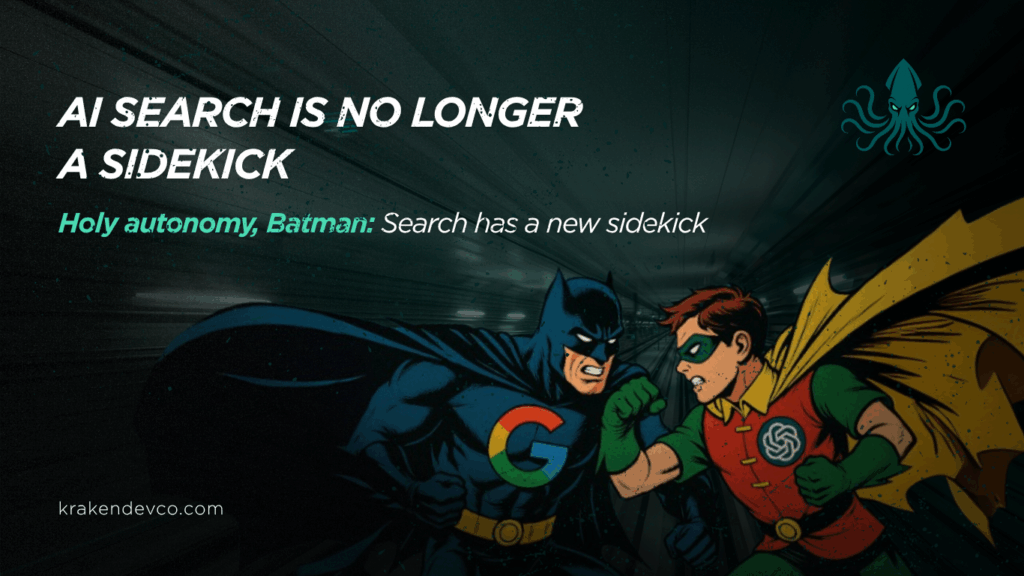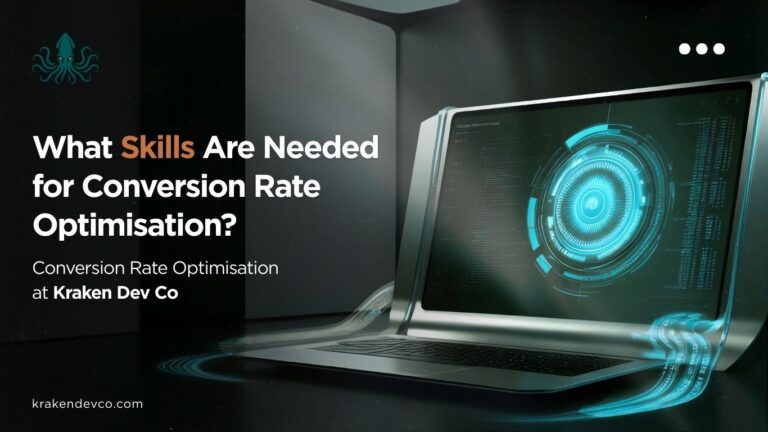
Holy autonomy, Batman: Search has a new sidekick
Back in February 2025, AI search looked like a promising complement to Google. Now, it’s actively reshaping how people find and engage with content.
Google’s AI Overviews now appear in over 13% of all searches—a 72% jump since January. We’re past the testing phase. This is mass deployment.
I’ve been tracking this acceleration closely. If your SEO strategy is still stuck in 2023, you’re already bleeding traffic. Here’s what’s changed, what’s next, and what we’re building for now.
From Blue Links to AI Summaries
Google’s “AI Mode” is no longer theoretical. It’s rolling out across U.S. search interfaces, with the UK next in line by year’s end.
Instead of delivering ten links, it delivers one AI-generated answer. These responses are multi-sourced, semantically rich, and contextually aware. It’s not just about both facts AND synthesis.
What this means for your site:
- Top-ranking content still matters, but it must be AI-readable and structurally rich.
- Zero-click is the new normal. Over 58% of searches now end without a click.
- CTR for position 1 drops up to 35% when AI Overviews are present.
The February Forecast Was Conservative
HigherVisibility’s survey found that 71.5% of users had tried AI search tools, but only 14% used them daily. At the time, that felt like a slow burn.
Now we know it was just the warm-up act.
By June, over a billion people had interacted with Google’s AI Overviews. In some verticals, such as Health (23%) and Science (20%), AI summaries now dominate result pages.
A recent study revealed how dramatically this has shifted user expectations and behaviour. This isn’t generational adoption. It’s a systemic rewrite.
SEO Has Moved to a Semantic Layer
Your content still matters, but its semantic integrity matters more.
To show up in AI summaries, your site needs:
- Precise structured data (JSON-LD, schema.org)
- Recognised entity mentions (people, products, locations)
- Clean topic clustering and internal link logic
- High E-E-A-T signalling: experience, expertise, authoritativeness, trust
AI assistants like ChatGPT, Perplexity, and Google Gemini don’t “read” your site. They parse it, assess semantic structure, and decide if you’re credible enough to quote.
If your content isn’t structured and aligned with known entities, you’re not in the summary.
AI Visibility ≠ Organic Traffic
Appearing in AI Overviews is not the same as winning clicks.
Click-through rates drop significantly when summaries are triggered (especially for desktop). In some cases, clicks fall by nearly two-thirds.
You’ll need to track:
- How often your content is cited or summarised
- Brand mentions within AI-generated results
- Traffic driven by AI citations, even if it appears as “direct” in analytics
Google recently fixed an attribution bug in AI Mode that was misclassifying traffic. Now we have better clarity, but it’s still early.
Tools like WriteSonic’s GEO AI Analytics can help monitor how often your site is being scraped or surfaced by AI engines.
Google Isn’t Killing SEO. It’s Killing Lazy SEO.
Spam content, keyword stuffing, and thin blog posts are obsolete. AI search reveals structural weakness instantly.
What’s working in 2025:
- Deep, authoritative content with unique insights and citations
- Custom schema that enhances AI interpretation
- Topic clusters built around entities, not just keywords
What’s punished:
- Low-quality AI fluff
- Surface-level SEO pages
- Content with poor E-E-A-T alignment
It’s less about chasing keywords and more about giving search engines something coherent to work with. Schema, structure, and a bit of semantic elbow grease go a long way, the kind of advanced SEO that shapes how it’s understood.
Preparing for Google’s Full AI Mode
This isn’t just a UX shift. It’s a change in how people think through search. “Best project management tool” turns into “free, secure, open-source PM tool for teams under 10 with AI features.” If your content can’t meet that level of clarity, it won’t show up. It’s a different kind of complexity that leans on AI development to interpret, not just index.
Metrics That Matter in an AI-Dominated Search Environment
Your 2023 KPI dashboard is useless now. Here’s what you should be tracking:
- Citation frequency in AI answers
- Brand sentiment post-summary inclusion
- Structured data depth
- Semantic relevance of content clusters
- Assisted conversions and influence points across AI and social channels
Tools will evolve, but strategy stays constant: Own the answer, not the keyword.
AI Tools We Actually Use
AI isn’t just reshaping search. It’s restructuring how we build for it.
Here’s what powers our stack:
- Frase.io: Semantic content optimisation
- SE Ranking: Smart auditing and briefs
- ChatGPT: Quick Schema fixes and base block generation, redirect rules, technical guidance
- There’s An AI For That: Discovery of niche tools
We also use mixed systems to monitor AI assistant responses and calibrate what content gets quoted where. It’s part of a broader approach to integrating AI, outlined in our services page.
AI Isn’t the End of SEO. It’s the End of Excuses.
If you’re out here looking for a confirmation bias that AI is destroying SEO like an angry child with a napkin (get the reference and one day we may be discussing mates rates), then I’m afraid you will be horribly disappointed. AI search doesn’t destroy SEO, it just changes the game. Which, of course, means you’re just going to have to stop blaming everything else for your ranking and do some work.
You’ve got the tools. You’ve got the data. So if your content still isn’t showing up, it’s not the algorithm; it’s the architecture.
Forget the trends. These are the fundamentals that continue to get results (AI or not).
Strip away the fluff, the hacks, and the hype, and here’s what’s actually surviving in 2025:
- Content that’s machine-parseable and human-credible
- Structure that makes your expertise visible
- A strategy that serves both bots and users
You still have to know what you’re talking about.
AI hasn’t killed SEO. But it has upped the ante for people who know how to use it.
Letting AI write your content, build your schema, plan your strategy, and call it a job done? That’s not SEO. That’s delegation with consequences.
Use AI where it shines: spotting semantic links, surfacing search terms, debugging code, analysing data, and plenty more I’m not here to list. (It does all that without you even looking at an invoice.)
Get creative. Use it wisely. Learn by doing before you throw your entire stack at an LLM…… or pay us to do it properly.
We build content that gets quoted, ranked, and read—backed by schema that machines understand, SEO that drives actual leads, and custom code that solves real problems. Because in 2025, relevance isn’t optional and it can be engineered!
Want AI to cite you, not your competitors?
Talk to Kraken Dev Co. We don’t just optimise for rankings. We build for relevance in a machine-driven web.




